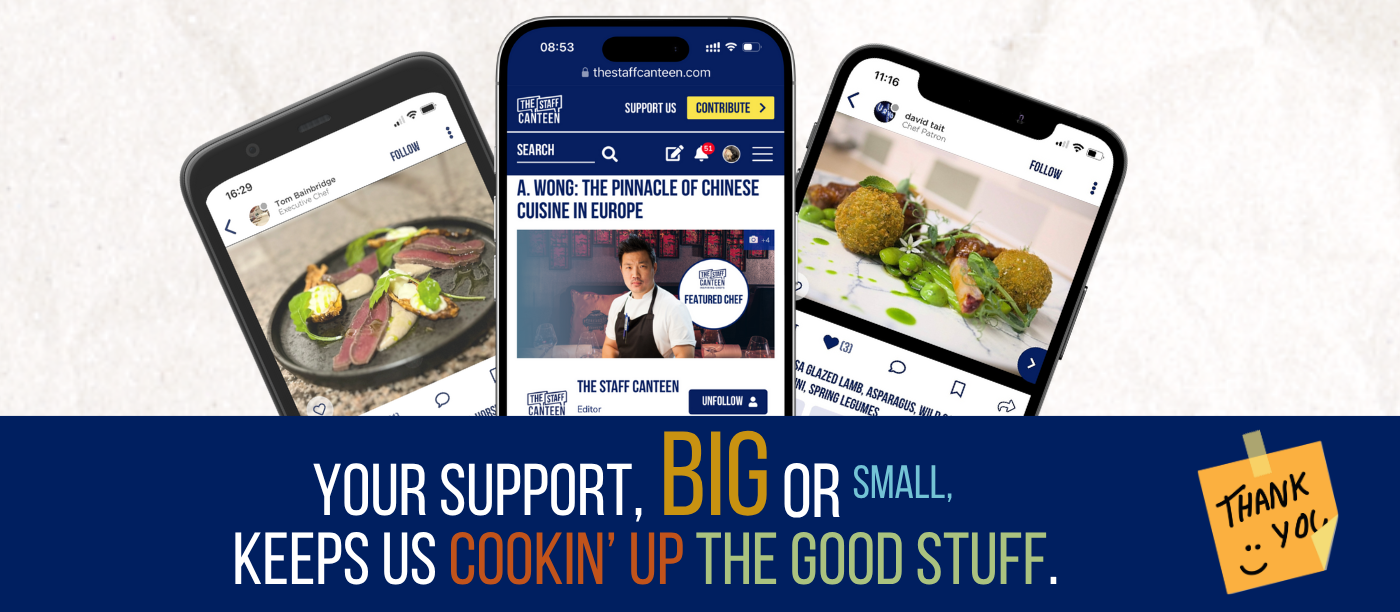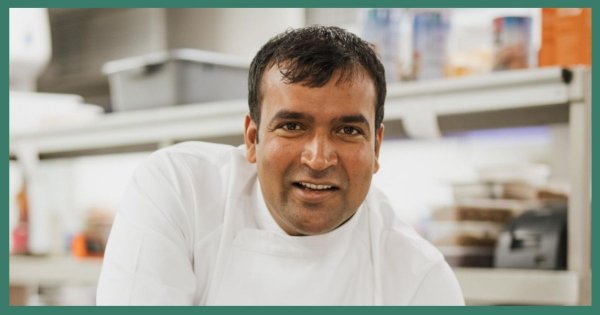'I’m incredibly happy with how my life turned out. I could never have dreamed for more'

When Bart van der Lee stepped onto the set of MasterChef: The Professionals, he was in it to prove something.
A private chef for more than a decade since training in the Michelin-starred kitchens of Toine Hermsen, Hans van Wolde, Michel Roux and René Redzepi, Bart wanted to see if he had the fine-dining streak in him.
When he was a child, Bart wanted to be a carpenter, but his parents nudged him in a different direction.
"We had to make a little bird house and I obviously thought I was going to do an amazing job."
"I brought it home and my mum and dad said, ‘hm, that didn’t go very well’. It was a big bump for me."
The chef began life in a remote, forested area in the Netherlands, where he and his family spent their time growing produce, foraging and cooking fresh ingredients straight from the ground.
“We were really free. My brother and I would go out in the forest and do whatever we’d like, build dens and dig holes."
When he was a teenager, they moved to a farm set beside a river.
“It was a great place," he said. "I spent the weekends fishing with my brother, on my own or with my friends, just walking down the back garden to catch something and cook.”
When he was in his late teens, he got a job as a kitchen steward. "Then one day a crazy Italian chef came in. He made a nice menu but he just couldn’t handle it. It was always too much and he was always in the s**t. He started asking me to come and help him out in the kitchen.”
“Couple of garnishes on the plate, nothing fancy, but he said I was really good at it. I’d just had my disaster with my bird house, so having a new occupation to focus on, I decided that I wanted to become a chef.”
Bart signed up to go to cooking college and spent the next four years as an apprentice, each year in different restaurant.
In his second year, his mum spotted an advert in the newspaper for a job at a three Michelin-starred restaurant and suggested he apply, but he pointed out that it was 170km away from where they lived.
“She said, ‘well, if you want to go and work, we’ll get you a room.’”
“I didn’t get the job, but it set me free of where I could work and how far I could go."
He found another role "in a very small village in a beautiful Italian restaurant" which was rated one of the best in the country at the time.

hasselback potatoes and ruby port jus
From there, the chef went on to work at Michelin-starred Toine Hermen’s restaurant.
“He’s my big chef," he said. "That’s where I really learned the trick of the trade. He really showed me to care for the food that you put on the plate – not the presentation necessarily, he was never busy with the food, he was only busy with how you would eat.”
“He would say ‘think about when you put that spoon in what it’s going to catch and how it’s going to go down. Don’t spread it on the plate, you’re not going to have the flavour sensation of eating the flavours together.’”
Bart enjoyed his time there so much that he didn’t want to leave, but after three years, sensing he had got everything he was going to get out of his kitchen, Toine showed him the door.
The chef called one of his friends who owned a Michelin-starred restaurant and recommended Bart for a job, where he would learn the value of using the freshest of fresh ingredients.
“This man was the king of fresh fish and grilling – he was unbeatable, to perfection. Everything was cooked last minute, he would fillet during service, his sous-chef would grill it, I would put in on the plate, garnish it and that was it."
“It’s a beautiful mentality," he said, "I still try to live by it now."
The chef then packed his bags and made his way to The Waterside Inn in Bray for a stage, followed by another at Noma. Then,

“I got offered a position as head chef of a resort. It was temporary until I moved on,” he said. But once he was there, he realised that he was quite enjoying himself.
“Life was pretty good;" he was designing his own menus and the restaurant was so close to the sea that he had first pick of the fishermen's catch.
"I’d get lobsters delivered fresh in the morning, massive crabs being caught right outside the restaurant.”

sage and pine nut crunch
“It was a different type of cooking and different ingredients but I found it very exciting. I learned to cook with pulses, chickpeas, lentils and rices. It’s a relatively poor cuisine, which was really difficult in the beginning but it makes you think differently."
And this started to sew the seed of the chef we know today: it was here, fourteen years ago, that the chef met the family he still works for today as a private chef.
With more experience under his belt, “I started working on the yachts and this whole new world opened up to me: on these big boats you can buy anything, everything is available.
"You get the most beautiful herbs driven to you by speedboat, fishing was done by the guests or by my boss – he caught seabass, beautiful oysters, went diving for sea urchins... Everything is right there where you are."
"It’s a beautiful way of cooking and in my profession, it works really well. I make something different every day as a private chef.”
Now stationed in Kensington, the chef has access to the UK's best produce on his doorstep, not to mention the produce he has growing in the back garden.
Mourning Michelin
The chef admits that having gone down the route he chose meant that he had to mourn his aspirations to own a Michelin-starred restaurant. But in many respects, his career has been all the better for it.
“I’m incredibly happy with how my life turned out. I could never have dreamed for more.
"Not going to Noma and starting in Egypt," he said, "it haunted me for a while, because my aim from day one was to become a top chef. I wanted to have one, two, three Michelin stars, that was all I was after.”
“When that didn’t happen, it was strange," and for several years the chef felt slightly unsettled.
“But there were other aspects of life that came with it that I had no idea of when I was working in those restaurants.
Back then, he explained, he had been "really proud of working five-six days a week, 17-18 hours a day."
"I was a young chef and I thought it was great. I thought it was wonderful, my best friends were in the kitchen, but when I moved to Egypt I realised there was something else to life.”
“I had bit more peace and time to create, enjoy and do a bit of business as well.” Alongside cooking, the chef took on managerial duties and even had an eye on the finances.
He oversaw a team of 20 private chefs in the Caribbean, many of whom were from Asia and taught him about Malaysian, Japanese, Indonesian, Thai cuisines.

"I made peace with my new lifestyle because I was seeing beautiful things all over the world in the most amazing destinations. I worked in ski resorts, on private jets, yachts, in destinations you would never dream of if you cooked in a kitchen from 8am till 12pm. I can’t say that I regret that decision.”
MasterChef
Yet, still, a doubtful voice arose in his head from time to time, pondering whether he still had it in him to cook fine-dining restaurant food. So he applied to be on MasterChef: The Professionals.
"As a private chef, it’s not my everyday type of cooking. I cook for a family," he said, and although this means cooking with the best produce, filleting his own fish, butchering his own meat, "it’s different to pushing out a 7-course meal for 80 people in a restaurant.”
“My first three plates were horrible. Marcus [Wareing] would have chucked them in the bin," he scoffed. "But I remembered quickly.”
“I started getting the refinement back, keeping plates simple but always adding that touch – black garlic, cumin, mango, these different flavour components that I picked up all along the way.”
“There was always a touch but it was always based on classic French training and that’s clear throughout my cooking.”
Short of winning the title, Bart was among the four finalists in the competition, alongside Santosh Shah, Philli Armitage-Mattin and Alex Webb, all highly talented chefs.
“Meeting all the chefs from the show was really cool," not just the other contestants but host judges Marcus Wareing and Monica Galetti, Andrew Wong and Aktar Islam, and the experience has borne fruits in ways Bart couldn't have expected.
“To be submerged into the British food scene is something that I never really expected because I’m not in a restaurant, I usually cook behind closed doors.
"This is the other end of the spectrum, the whole country is looking at what I’m doing everyday, cooking in amazing houses for families, little companies…”
“Without restaurants critics or a restaurant, you don’t reach very many people,” but after MasterChef, “social media exploded, I had a really good website set up so people know where they can go and what they can get from me, people love private dinners and now, Masterclasses.”
More than one way to be a chef
“Many people, when they become chefs they think there’s only one way to be a chef and that’s just to work in a restaurant and that’s the end of your life.
"That's fine for some, but if you have a business mentality there’s so much you can do with cooking.”
“I’ve always been looking for things to do on the side, it’s in my nature, I always want to do something a little bit different.”
“You’re very vulnerable if you’re only chasing one job and you’ve nothing to fall back on."
Bart has more projects in the pipeline, and he is certain that “the future will be diverse.”
“There are different lines of income and business that I’m really enjoying.”
With travel back on the cards, Bart wants to learn about more foreign cuisines and cultures; he and his wife are working on a TV pitch for a travel and cooking show, but the details of this are still under wraps.
“We’re not trying to do anything that we’re not going to do anyway, because of this unique lifestyle, because of the way that we live and I work, the story can sell itself. I hope to pull it off,” he grinned.

For 17 years, The Staff Canteen has been the meeting place for chefs and hospitality professionals—your stories, your skills, your space.
Every recipe, every video, every news update exists because this community makes it possible.
We’ll never hide content behind a paywall, but we need your help to keep it free.
If The Staff Canteen has inspired you, informed you, or simply made you smile, chip in £3—less than a coffee—to keep this space thriving.
Together, we keep the industry connected. Together, we move forward.















